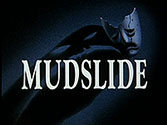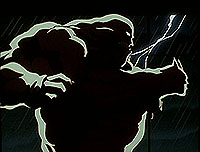|
||
|
| Credits | Cast | |
Story by Alan Burnett Teleplay by Steve Perry Directed by Eric Radomski Music by Shirley Walker Animation by Studio Junio |
Kevin Conroy as Bruce Wayne Efrem Zimbalist Jr. as Alfred Ron Perlman as Clayface Rob Clotworthy as Billy Pat Musick as Stella Bates Marcia Wallace as Fiancee |
|
|
If "Mudslide" were a serious episode, it would demean its integrity to turn the ending into just another matinee serial escape from mortality. Fortunately, I cannot take it seriously—it has too many marvelous jokes. Stella Bates (so Hagen, doing his best Brando, can cry "Stella!"), who used to own a motel (the "Bates" Motel, we groan), saves Hagen by encasing him in a shell that leaves him looking like an Oscar statue. She weeps over old movies (produced by Warner Bros.) with titles like "Dark Interlude" (recalling melodramas Dark Victory and Strange Interlude). She screams as Batman tries to burst from Clayface's chest (á la Alien) and the whole ridiculous enterprise climaxes on a dark and stormy night outside the scientist's laboratory (any old Universal horror picture) with the hero and villain dangling from a high place while the latter's grip slowly, slowly slips away (Saboteur). I am not aware what "Tarnower Financial" or "MD 40" refer to, but in a broth this rich it is hard not to think that they signify. Now, in calling it ridiculous and saying that I cannot take it seriously, I am not criticizing or belittling it; far from it. It is deliriously entertaining; it squeezes the conventions of melodrama until the pips squeak. A spectacular death and astonishing resurrection are perfectly consistent with this kind of good clean fun, as any viewer of soap operas knows. I argued about "Feat of Clay" that Matt Hagen's tragedy is not a tragedy in the classical sense but an existential one, a reduction to absurdity. Here, his physical decay is the outward sign of his moral and psychological decay (a feature Alfred shrewdly picks up on). When he comforts Stella, we know that he is only quoting snippets of dialogue from one of his old movies because we just saw that scene played on television. But how many other bits of his dialogue are culled from or are paraphrases of lines from his career? "Let's cut to the chase. The MD40, where is it?" "Run, run for your measly lives! Run from Clayface!" "It ends now!" Only an imitative actor now and not a moral agent, he can advance his plans only by forcing circumstances into familiar dramatic patterns and then following his instincts. No wonder he has to die, only to reappear in the sequel!
What might be next for Clayface? Might I suggest a political career, as a mayoral candidate or governor who affects the air of a genial but slightly bewildered grandfather. Or, since he has to die luridly at the end, as a canny, handsome, charismatic young playboy whose assassination (followed by a coverup) sparks conspiracy theories that come nowhere near the truth. . . . |
|
|
|
Related Episodes |
What Others Are Saying ... |
| Back to Moon of the Wolf |
Forward to Night of the Ninja |



